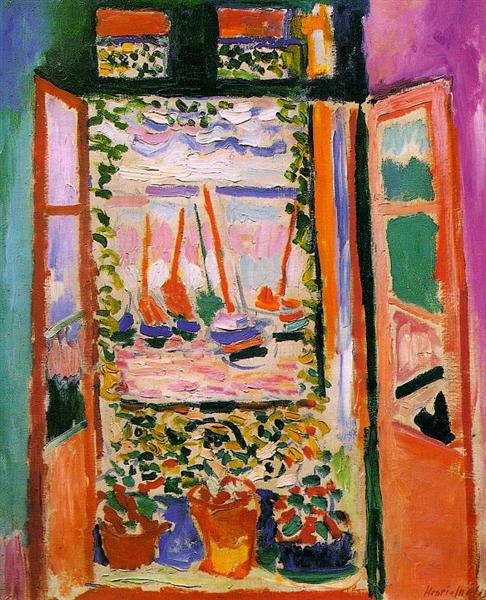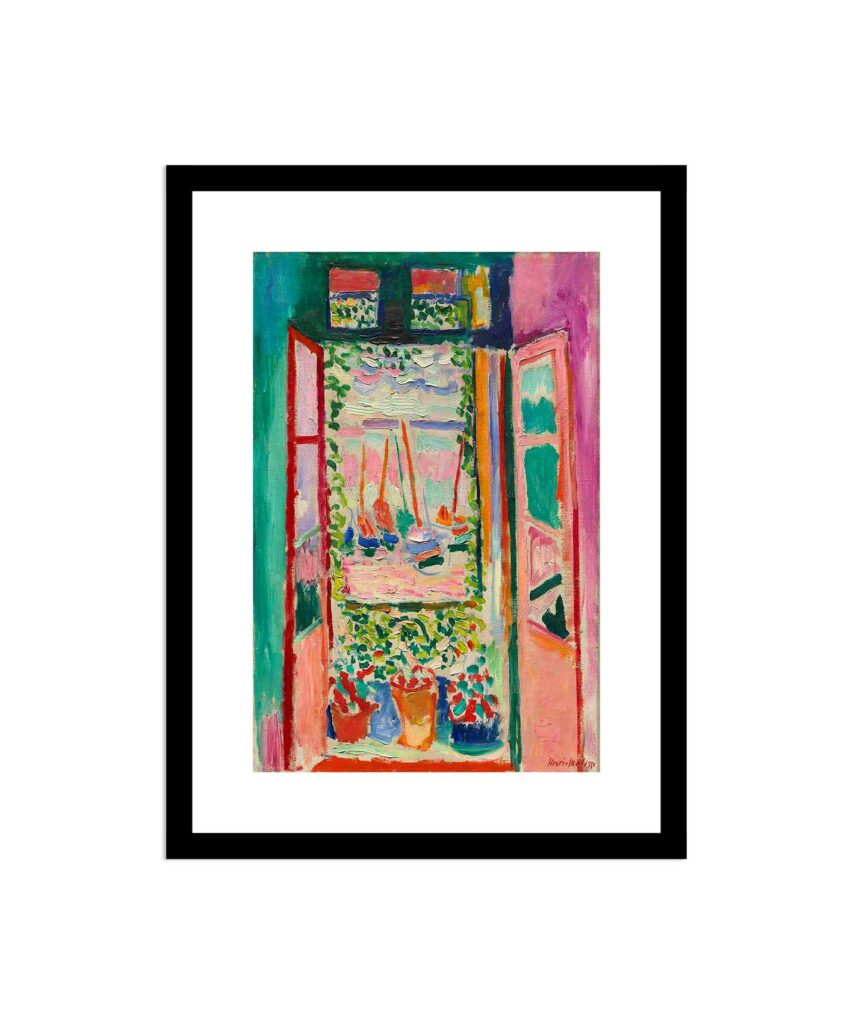Printer
Matisse’s Open Window Print: A Captivating Masterpiece
When we think of the art world, we often imagine somber portraits, landscapes, or still life paintings adorning museum walls. However, Henri Matisse’s Open Window print breaks away from that tradition entirely. This masterpiece is a captivating representation of a window opening onto the beautiful French Riviera landscape you simply cannot ignore.
The vibrant colors and intricate details in Open Window immediately grab the viewer’s attention. Every nuance – the blueness of the sea, the greenness of the trees, the brightness of the flowers – has been carefully captured and brought to life through Matisse’s brushstrokes. It’s no wonder that this print has become one of the most celebrated pieces of modern art in history.
But beyond its sheer beauty, Open Window also represents a turning point for Matisse. It marks his move towards the Fauvist movement, in which bold colors and striking images were celebrated above all else. This shift in style was revolutionary, and Matisse’s print continues to be seen as an essential piece of art that reflects a change in the world of art itself.
In short, Open Window is much more than just a beautiful print – it’s a fascinating work of art that captures the essence of the French Riviera and a crucial point in modern art’s evolution. Allow yourself to be captivated by its beauty and intrigued by its deep meaning by taking the time to experience it for yourself.
“Matisse The Open Window Print” ~ bbaz
Comparison Blog Article: Matisse’s Open Window Print: A Captivating Masterpiece
Introduction

Henri Matisse’s Open Window print is considered one of the most captivating masterpieces in the world of art. It is created with a blend of vibrant colors and impressive brush strokes that make it stand out among other artworks of its time. The image depicts a view of an open window relationship between the indoors and the outside world. In this article, we will compare Matisse’s print against some other popular artworks, discuss its background, techniques, and impact on the art scene.
Art Style and Technique

Henri Matisse’s art style was a blend of various movements, including Fauvism, Impressionism, and Modernism. He was inspired by his surroundings, travels, and experiences, which he expressed in his paintings through the use of bold, bright colors and dynamic brush strokes. The technique used in creating the Open Window print was the linocut, where the artist carves out a design or image onto a linoleum block, inks the surface, and then presses it onto paper or any other material.
Comparison with Vincent Van Gogh’s Starry Night

Vincent Van Gogh’s Starry Night is one of the most recognizable paintings in art history. It is renowned for its swirling, frenzied brush strokes and intense color contrasts. Both Matisse and Van Gogh used colors to create drama in their artworks, but while Starry Night features dark blues and yellows, Open Window utilizes brighter colors, giving a sense of warmth and lightness.
Comparison with Edvard Munch’s The Scream
Edvard Munch’s The Scream is a painting that expresses anxiety and despair. The artwork features a central character screaming against the backdrop of a fiery sky. In contrast, Open Window is not as emotionally charged, and while it portrays feelings of openness and free-flowing creativity, it lacks the profound depth displayed in The Scream.
Symbolism and Meaning

Matisse’s Open Window print is an expression of the relationship between the indoors and the outside world. The painting features an open window frame that allows the viewer to see a glimpse of the surrounding landscape, adding color and freshness to the otherwise monotonous indoor space. With Open Window, Matisse shows his ability to capture emotions of space and the atmosphere around it.
Comparison with Edward Hopper’s Nighthawks

Edward Hopper’s Nighthawks is a painting where three people are seen sitting in a diner late at night. The artwork showcases feelings of loneliness and despair, with figures seemingly trapped in their own thoughts. In contrast, Open Window offers an escape from these negative emotions and allows the viewer to enjoy nature’s beauty and all of its many colors and forms.
Influence on Modern Art

Henri Matisse’s ‘Open Window’ print was part of a movement that inspired modern art. His skills and techniques helped shape the way art is viewed today, and the simplicity of his work makes it accessible to all. For instance, the painting has become one of the most recreated by a new generation of artists, who skillfully use Matisse’s style and technique to create their works.
Comparison with Pablo Picasso’s Guernica

Pablo Picasso’s Guernica is a painting that expresses the horrors of war with chaotic forms and a distressed palette. The artwork has become a valuable symbol of peace and the continued struggle against injustice. In contrast, Open Window is a much simpler and less emotionally charged piece that reflects nature’s beauty, making it an excellent display opposite in Picasso’s work’s complexity.
Conclusion

Matisse’s ‘Open Window’ is indeed a captivating masterpiece that is unique in its way. It manages to showcase nature’s beauty and the relationship between the indoors and the outdoor world. With each artistic movement detailed in this article, you can understand how it’s unique from other paintings while being part of modern art movements. It proves how art can be expressed in many ways, bringing different emotions to the surface.
Matisse’s Open Window Print: A Captivating Masterpiece
Thank you for taking the time to explore Matisse’s Open Window Print in our blog. This captivating masterpiece, without title, is a true representation of Matisse’s unique artistic style and bold use of color.
The intricate details within the composition of the artwork are evidence of Matisse’s diligence and skill as an artist. With each brushstroke, he conveyed depth and dimension, bringing the scene to life before our very eyes.
We hope that exploring this stunning work of art has provided you with a deeper appreciation of Matisse’s contributions to the world of modern art. As we conclude our discussion of this magnificent piece, let us take a moment to reflect on the beauty and wonder that exists in the world around us.
Once again, thank you for visiting our blog and delving into the world of art with us. We hope to see you again soon!
People Also Ask about Matisse’s Open Window Print: A Captivating Masterpiece:
- What is Matisse’s Open Window Print?
- What is the significance of Matisse’s Open Window Print?
- Where can I see Matisse’s Open Window Print?
- What other artworks are similar to Matisse’s Open Window Print?
- What techniques did Matisse use in creating Open Window Print?
Matisse’s Open Window Print is a captivating masterpiece created by the French artist Henri Matisse in 1918. It is a color lithograph print that depicts a view of the Mediterranean Sea through an open window in his apartment in Nice, France.
Matisse’s Open Window Print is significant because it exemplifies Matisse’s unique style of Fauvism, which emphasizes bold and vibrant colors, simplified forms, and a sense of decorative pattern. The print also reflects Matisse’s interest in capturing the beauty and tranquility of nature, as well as his fascination with the play of light and shadow.
Matisse’s Open Window Print is part of many prestigious museum collections, including the Museum of Modern Art in New York City, the Art Institute of Chicago, and the National Gallery of Art in Washington D.C. It is also available for viewing online through various art websites and digital collections.
Other artworks that are similar to Matisse’s Open Window Print include his other interior scenes, such as The Red Studio and Interior with Goldfish Bowl. Other artists who also created similar works include Pablo Picasso and Georges Braque, who were also part of the Fauvism movement.
Matisse used a color lithograph technique in creating Open Window Print. This involved drawing the image onto a flat stone or metal plate using greasy materials, then applying ink and pressing it onto paper to create a print. Matisse also used his signature style of bold and vibrant colors, simplified forms, and decorative patterns to create the image.

